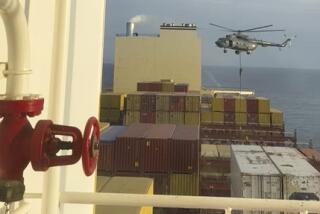Islands Retaken From Iranians, Iraq Reports
- Share via
NICOSIA, Cyprus — Iraq said that its forces recaptured the Majnoon Islands in the petroleum-rich southeastern part of the country Saturday, removing Iran’s last strategic foothold in Iraqi territory in their eight-year war.
A military communique broadcast by Baghdad Radio said that the islands were regained in heavy fighting by Iraq’s elite Presidential Guards after four years of occupation by Iranian troops. “The resistance of the enemy deteriorated and collapsed due to the Iraqi heavy fire,” the communique said.
Iran acknowledged that heavy fighting was taking place in the sector, which lies near the Iraqi-Iranian border. It accused the Baghdad government of using chemical weapons in the attack.
A Striking Victory
If confirmed by independent sources, the reconquest of the Majnoon Islands represents a striking victory for the government of Iraq’s President Saddam Hussein.
Since April, Iraqi forces have driven Iranian forces from their major footholds in the southern Faw Peninsula and from positions in Shalamcheh east of the southern port of Basra, removing the last threat to Iraq’s second-largest city.
In addition, rebel Iranian forces called the National Liberation Army earlier last week attacked and briefly seized the Iranian border town of Mehran, a humiliating setback for the Tehran government.
Foothold in Kurdistan
After eight years of fighting and nearly a million casualties on both sides, all Iran can point to as a victory in the fighting is a limited amount of territory in Iraqi Kurdistan, which is held by a combination of Iranian Revolutionary Guard units and Kurdish rebels. The captured areas are regarded as more of an irritant than a strategic disadvantage by the Iraqis.
Earlier this month, the deteriorating Iranian position on the battlefield prompted Iran’s spiritual ruler, the Ayatollah Ruhollah Khomeini, to appoint Hashemi Rafsanjani, the Speaker of the Majlis (Parliament), to the post of acting commander in chief.
Rafsanjani publicly noted that there had been a lack of coordination between Iran’s regular army units and the Revolutionary Guards and volunteer forces, leading to a “serious” situation on the war fronts. But whatever steps Rafsanjani may have taken to reverse the tide of losses have not yet been publicly disclosed.
Wave of Assaults
The Majnoon Islands--in reality a series of muddy hillocks--were captured by Iran in February, 1984, as part of a wave of assaults near the Hawizah marshes aimed at cutting off Basra from the rest of Iraq. Basra is not only Iraq’s second most populous city, but its population, like Iran’s, is made up mostly of Shia Muslims, and Tehran hoped to established a breakaway republic there, loyal to the Iranian revolution.
But the Iranian thrusts failed to produce solid gains, with Iran losing tens of thousands of soldiers on the battlefield. Iran charged at the time that Iraq had used large amounts of mustard gas, an accusation generally accepted by independent inquiries.
Virtually the only success of the 1984 offensive was the capture of the desolate Majnoon Islands in marshy terrain where Iran was able to make maximum use of its mobility and small boats, while Iraq’s overwhelming superiority in tanks and artillery could not be effectively employed. The area is part of the Rumeila oil fields, with petroleum reserves estimated at 50 billion barrels, among the largest in the world. The wells were capped by Iraq before the Iranian offensive in 1984.
More to Read
Sign up for Essential California
The most important California stories and recommendations in your inbox every morning.
You may occasionally receive promotional content from the Los Angeles Times.













